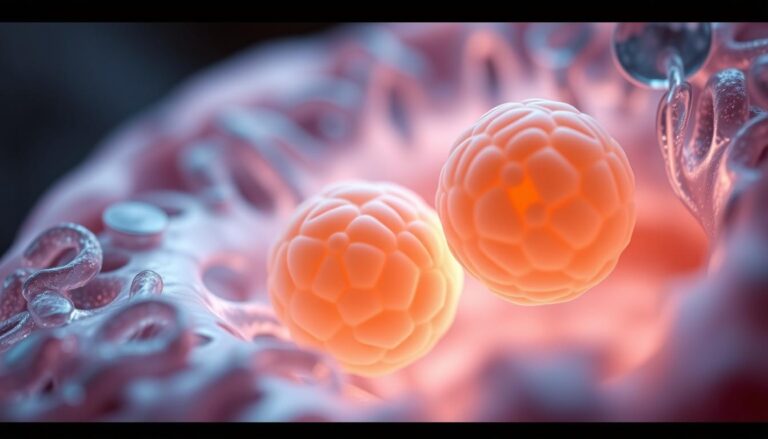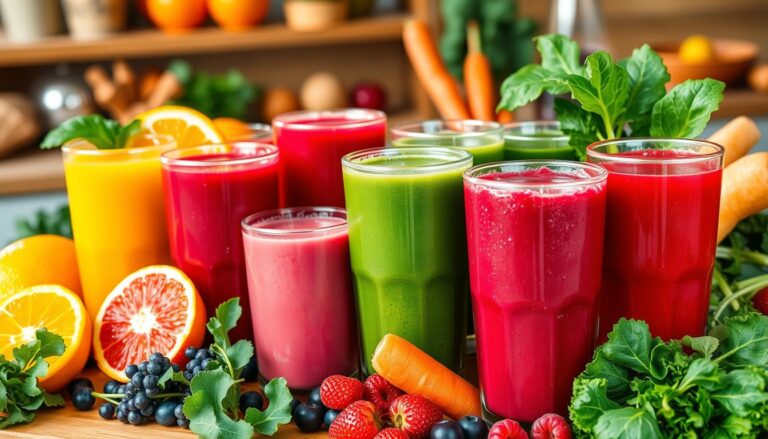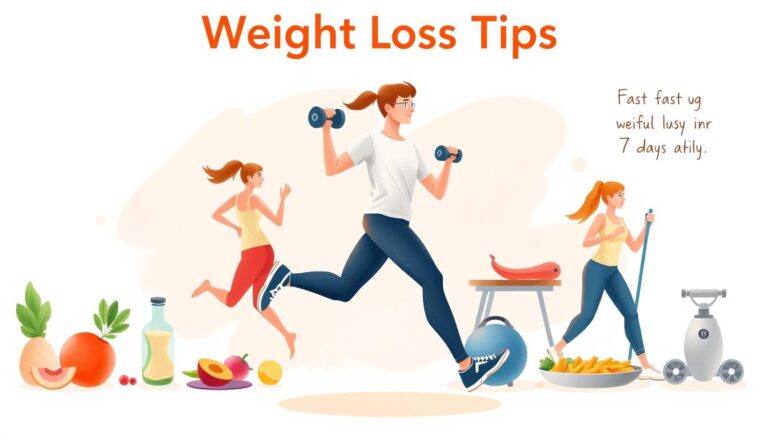Are you dealing with ongoing digestive issues like bloating or constipation? The secret to a happy gut might be in your gut microbiome’s balance.
We’ll share tips to improve your digestive health and unlock your gut’s power. Are you ready to start a journey to a healthier gut?
Key Takeaways
- Discover the importance of gut bacteria and the factors that disrupt gut balance
- Embrace fiber-rich foods to nourish your gut microbiome
- Unlock the benefits of probiotics and how to incorporate them into your diet
- Understand the gut brain connection and the role of stress management in gut wellness
- Explore natural remedies for common digestive disorders like IBS GERD, and more
Understanding the Gut Microbiome
The gut microbiome is a huge world filled with trillions of bacteria, fungi, and other tiny life forms. These tiny creatures are key to our health. They help with digestion and getting nutrients into our bodies. They also affect our immune system metabolism, and even our mood and actions.
The Importance of Gut Bacteria
Gut bacteria break down complex foods, vitamins, and nutrients for us. They keep our gut lining strong, stopping bad stuff from getting into our blood and causing inflammation. These bacteria are also vital for our immune system fighting off harmful germs.
Factors that Disrupt Gut Balance
- Eating too much processed food sugar, and unhealthy fats can hurt our gut microbiome.
- Stress can mess with the balance of gut bacteria causing stomach problems and affecting our mental health.
- Some medicines, like antibiotics, can kill off good gut bacteria, letting bad ones take over.
Keeping our gut balance healthy is key to feeling good. Learning about the gut microbiome helps us take steps to keep it healthy.

The gut is the gateway to health, and a thriving gut microbiome is the foundation for a healthy body and mind.
Embrace Fiber Rich Foods
Fiber is key to a healthy gut. Adding fiber-rich foods to your diet can greatly benefit your digestive system. It helps with regular bowel movements supports good gut bacteria, and lowers inflammation.
Whole grains, fruits, veggies, and legumes are great fiber sources. Swap refined carbs for whole-wheat bread, brown rice, or quinoa. Enjoy nuts and berries as snacks, or eat more leafy greens, broccoli, and lentils. There are many ways to get more fiber-rich foods into your meals.
Fiber is the key to a happy and healthy gut. Embrace it and let it work its magic!
Increasing fiber intake should be done slowly. This lets your body adjust. It’s also important to drink plenty of water when eating more fiber. This helps the fiber move through your body smoothly.
- Aim for 25-30 grams of fiber per day for optimal gut health.
- Choose a variety of fiber-rich foods such as whole grains, fruits, vegetables, and legumes.
- Gradually increase your fiber intake to allow your body to adapt.
- Stay hydrated to support the fiber in moving through your digestive system.
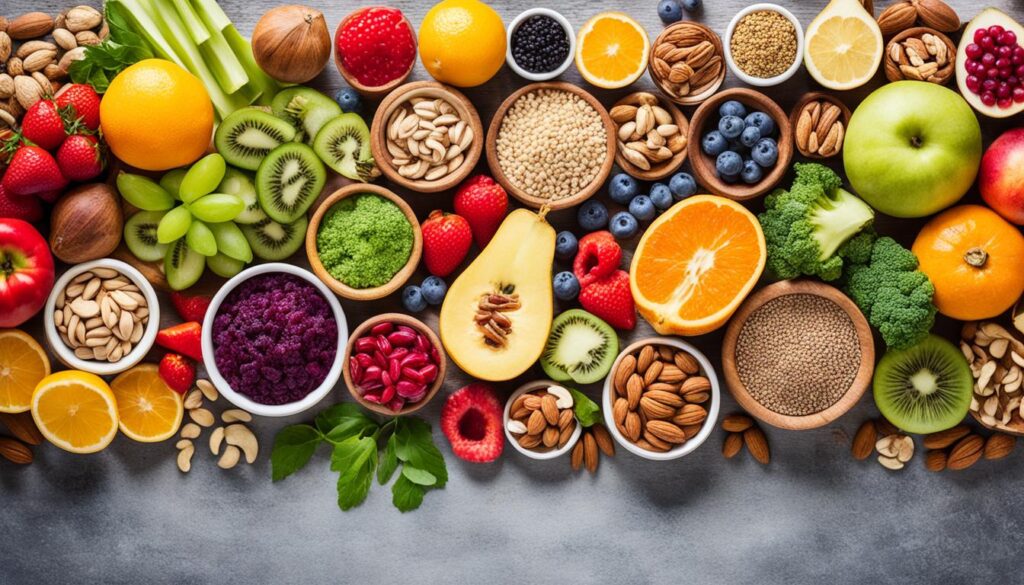
By choosing fiber-rich foods, you’re helping your gut health. Discover the benefits of fiber and let it lead you to better digestive health.
Probiotic Power
Probiotics are live microorganisms that live in our gut. They are key to keeping our digestive health strong. These gut friendly bacteria help keep our gut microbiome balanced. This balance is vital for our overall health.
By learning about the different types of probiotics, we can use their power to keep our gut healthy and happy.
Types of Probiotics
Our gut microbiome is full of various probiotic strains, each with its own benefits. Some of the most well-known include:
- Lactobacillus These bacteria support our digestive and immune systems.
- Bifidobacterium They help keep our gut microbiome balanced and support gut health.
- Saccharomyces boulardii A yeast-based probiotic that helps with certain digestive issues.
Incorporating Probiotics into Your Diet
There are many ways to add probiotics to your diet. You can choose from fermented foods or supplements. Here are some probiotic-rich foods to try:
- Yogurt Pick plain, unsweetened yogurt with live and active cultures.
- Kefir This fermented dairy drink is full of probiotics.
- Sauerkraut and kimchi These fermented veggies are great for gut health.
- Probiotic supplements Choose a high-quality one with many probiotic strains.
Adding probiotics to your daily life supports a healthy gut microbiome. This leads to a well-balanced digestive system.

Hydrate for Healthy Digestion
Keeping up with hydration is key for good digestive health and gut health. Water helps keep your digestive system well lubricated. It makes sure food moves smoothly through your intestines. It also helps make important digestive enzymes.
Make sure your gut works well by drinking lots of water all day. Being hydrated can cut down on constipation make stool easier to pass, and boost digestive wellness. The amount of water you need can change based on your age, how active you are, and where you live. So, pay attention to what your body needs.
| Hydration Benefits for Digestive Health | Potential Consequences of Dehydration |
|---|---|
|
|
So, put hydration first and let water help your gut health. Being well hydrated is great for your digestive function. It keeps your gut happy and healthy.
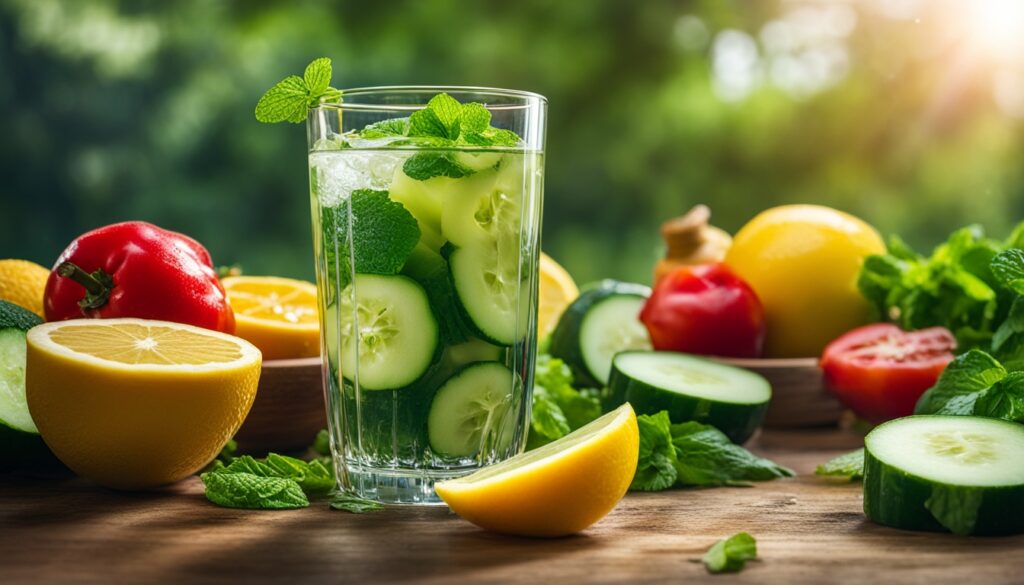
Proper hydration is essential for maintaining a healthy gut and supporting overall digestive function.
Manage Stress for Gut Wellness
The link between the gut and the brain is key to our health. This connection known as the gut-brain axis helps our bodies work right. It affects digestion mood, and how we think.
The Gut Brain Connection
Chronic stress can mess with our gut-brain axis. This leads to issues like bloating, constipation, or diarrhea. Stress makes our body release hormones that can harm our gut bacteria.
To keep our gut healthy we need to manage stress well. Meditation yoga, and deep breathing can calm our minds. They help reduce stress and keep our gut and brain in tune.
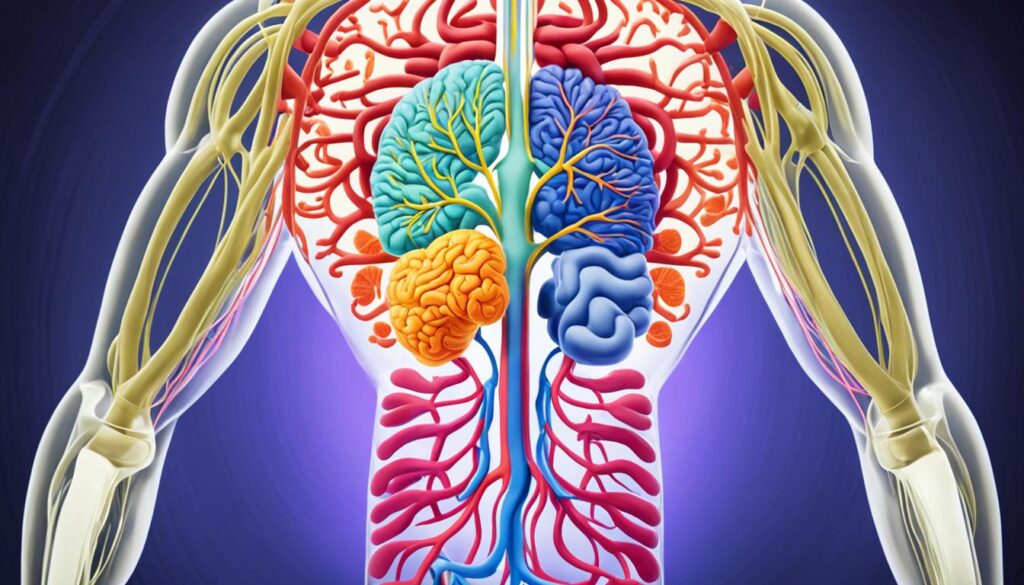
Maintaining a healthy gut-brain axis is essential for overall well-being, and managing stress is a critical component of this process.
By focusing on reducing stress we can support our digestive health. This improves our life quality.
A Holistic Approach to Digestive Health
For the best digestive health, you need a holistic approach. This means looking at your whole life, not just what you eat. By doing this, you can make your digestive system and overall health better.
Eating right is key to this approach. Foods high in fiber like fruits, veggies, and whole grains help your gut microbiome. Adding foods or supplements with probiotics is also good for keeping your gut balanced.
Stress is another big factor for gut health. Stress can mess with your gut balance because of the gut brain link. Try stress-lowering activities like meditation, yoga, or just relaxing to help your gut.
Being active is also important for your digestive health. Exercise helps your gut move better, lowers inflammation, and boosts your digestive system’s work. Try to mix in different types of exercise for the best results.
How you eat can also boost your gut wellness. Eat slowly, chew well, and focus on your meals. This helps with digestion and makes eating a better experience.
By taking this holistic approach, you can make the most of your digestive health and have a healthy gut. Everyone’s path to good gut health is different. So, be patient, try new things, and find what’s best for you.
Tackle Digestive Disorders
Dealing with digestive disorders can be tough, but knowing about them and taking steps early can help a lot. Conditions like irritable bowel syndrome IBS , Crohn’s disease, and ulcerative colitis can really affect your life. Gastroesophageal reflux disease GERD and acid reflux can also cause a lot of discomfort and might lead to bigger problems if ignored.
IBS Crohn’s and Colitis
IBS Crohn’s disease, and ulcerative colitis are chronic issues that cause symptoms like stomach pain, bloating, diarrhea, and constipation. These need doctor’s care, but changing your diet and managing stress can help ease symptoms and boost gut health.
GERD and Acid Reflux
Gastroesophageal reflux disease GERD and acid reflux happen when stomach acid goes back up into the esophagus, causing pain and possibly serious health problems if not treated. Finding and fixing the root causes, like diet, weight, and lifestyle, is key to handling these issues and keeping your gut healthy.
| Digestive Disorder | Symptoms | Treatment Approaches |
|---|---|---|
| IBS | Abdominal pain, bloating, diarrhea, constipation | Dietary changes, stress management, medication |
| Crohn’s Disease | Abdominal pain, diarrhea, weight loss, fatigue | Anti-inflammatory medications, dietary modifications, surgery in severe case |
| Ulcerative Colitis | Rectal bleeding, diarrhea, abdominal cramps, weight loss | Anti-inflammatory medications, dietary changes, surgery in severe cases |
| GERD | Heartburn, acid reflux, difficulty swallowing | Dietary changes, over-the-counter or prescription medications, lifestyle modifications |
Handling these digestive disorders needs a mix of medical care, diet changes, and lifestyle tweaks. With the help of doctors and making positive changes, people can manage their gut health and feel better overall.

Gut health is the foundation of overall health. By addressing digestive disorders, you can unlock the key to a healthier happier life.
Prebiotics Fuel for Probiotics
Keeping your gut healthy is key to feeling good overall. Prebiotics are a big part of that. They are a special kind of fiber that feed the good bacteria in your gut, called probiotics. This helps them grow and work better.
Eating foods high in prebiotics can make your gut microbiome healthier. Great sources of prebiotics are:
- Onions
- Garlic
- Bananas
- Whole grains
- Chicory root
- Jerusalem artichokes
When you eat prebiotic rich foods, you’re giving your gut’s good bacteria the food they need. This helps the probiotics work better. This can lead to better digestion, nutrient absorption, a stronger immune system, and a happier mood.
| Prebiotic-Rich Food | Benefits |
|---|---|
| Onions | Rich in fructooligosaccharides FOS , which nourish probiotics and promote better gut health. |
| Garlic | Contains inulin, a type of prebiotic that supports the growth of beneficial gut bacteria. |
| Bananas | High in resistant starch, which acts as a prebiotic and helps feed the gut’s probiotic population. |
| Whole Grains | Provide a variety of prebiotic fibers that nourish the diverse array of probiotics in the gut. |
Adding prebiotics to your diet regularly can make your gut a great place for probiotics to grow. This is good for your overall digestive health.
Prebiotics are the unsung heroes of gut health, providing the essential fuel that allows probiotics to thrive and perform their vital functions.
Exercise for a Happier Gut
Keeping your gut healthy is key to feeling good overall. Regular exercise helps a lot with this. It makes food move better through your intestines, lowers inflammation, and helps good gut bacteria grow.
Adding different exercises to your day can make your gut happier and stronger. You can try walks, yoga, or even strength-training. These activities are great for your gut health and digestive health.
- Boost Intestinal Motility: Regular exercise makes your intestines move better, helping food pass through smoothly.
- Reduce Inflammation: Exercise lowers inflammation in the gut, which can help with digestive problems.
- Promote Gut Microbiome Diversity: Working out can make more good bacteria in your gut, keeping your gut microbiome healthy.
Adding various exercises to your life is a big step towards a happier gut. It doesn’t matter if it’s a quick walk, a calming yoga session, or lifting weights. Your gut health and digestive health will get better with regular exercise.
A healthy gut is the foundation for overall well-being, and regular exercise is a powerful tool in maintaining that foundation. Dr. Emma Sinclair, Gastroenterologist
| Exercise Type | Benefits for Gut Health |
|---|---|
| Brisk Walking | Improves intestinal motility, reduces inflammation, and supports a diverse gut microbiome. |
| Yoga | Enhances the mind-gut connection, reduces stress, and promotes relaxation for better digestion. |
| Strength Training | Helps build muscle mass, which can positively impact gut hormone levels and nutrient absorption. |
Mindful Eating Habits
Starting mindful eating habits can really help your digestion and gut health. Being more aware and present at mealtime helps your body process food better.
Chew Thoroughly
Chewing your food well is key for breaking it down and good digestion. It helps your body get the nutrients it needs. This can make your gut health better and reduce issues like bloating and indigestion.
Eat Slowly and Mindfully
Eating fast can cause discomfort and digestive problems. Eating slowly and mindfully lets your body process food properly. This can stop digestive issues and improve gut wellness.
The key to a healthy gut is not just what you eat, but how you eat it.
Adding mindful eating habits to your daily life can greatly improve your digestive health and gut health. Enjoy your meals, chew well, and stay in the moment. Your body will be grateful.
Digestive Enzymes Nature’s Helpers
Digestive enzymes are key to our gut health. They help break down the food we eat. This makes it easier for our bodies to get the nutrients we need every day. By knowing how important digestive enzymes are, we can improve our digestive health and overall wellness.
These enzymes are great for gut health. They work well to break down complex foods like proteins, fats, and carbs. This helps our bodies absorb nutrients better. It also keeps our digestive enzymes healthy, which is good for our gut microbiome.
| Enzyme | Function | Food Sources |
|---|---|---|
| Amylase | Breaks down carbohydrates | Whole grains, bananas, honey |
| Lipase | Breaks down fats | Avocados, nuts, seeds |
| Protease | Breaks down proteins | Pineapples, papaya, fermented foods |
To get more digestive enzymes, eat foods like pineapples, papayas, and fermented foods. You can also use digestive enzyme supplements to help. These natural helpers can make your digestive health better and your gut happier.
Digestive enzymes are the unsung heroes of our gut health, playing a crucial role in the efficient breakdown and absorption of the nutrients we need to thrive.
Conclusion
Our journey into digestive health and gut wellness comes to an end. We’ve learned a lot about how to keep our gut happy and healthy. We’ve seen how eating foods high in fiber and using probiotics can make a big difference.
A healthy gut is key to a good life. By taking care of our gut, we can say goodbye to digestive problems. This leads to more energy and overall health.
As you start your own gut health journey, let these tips guide you. Enjoy your successes and don’t worry about setbacks. Remember, taking care of your gut is important for your overall health. Here’s to a future filled with good gut health!


